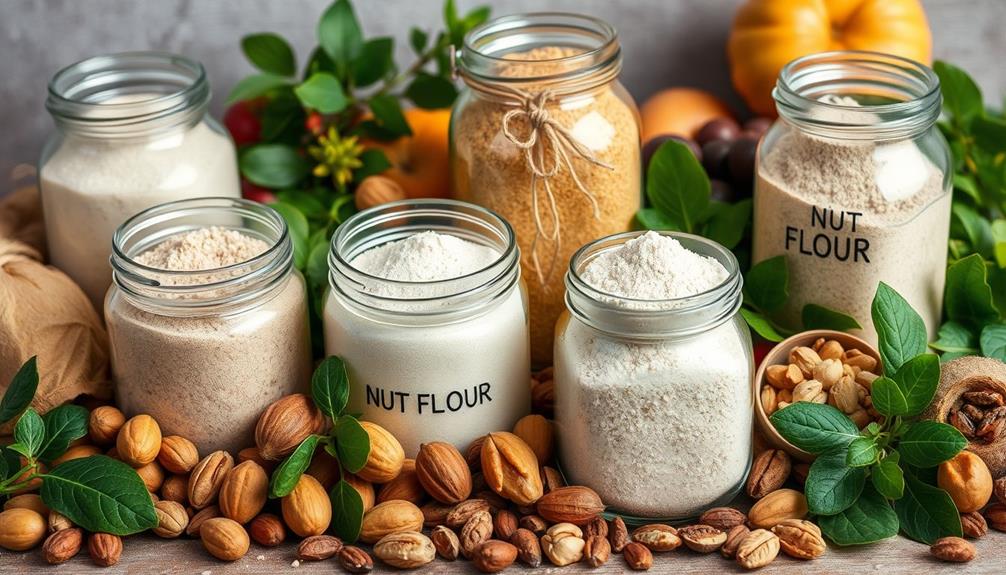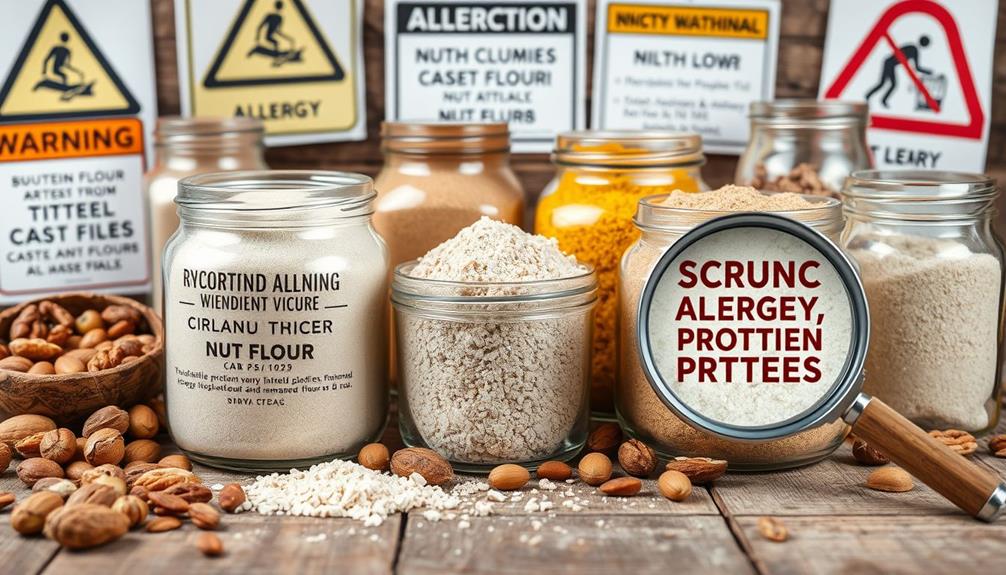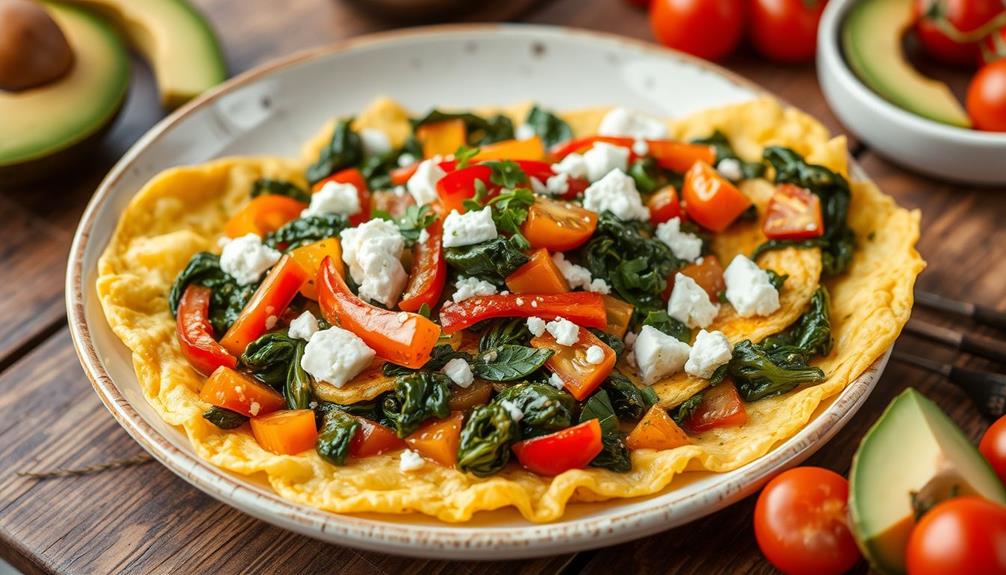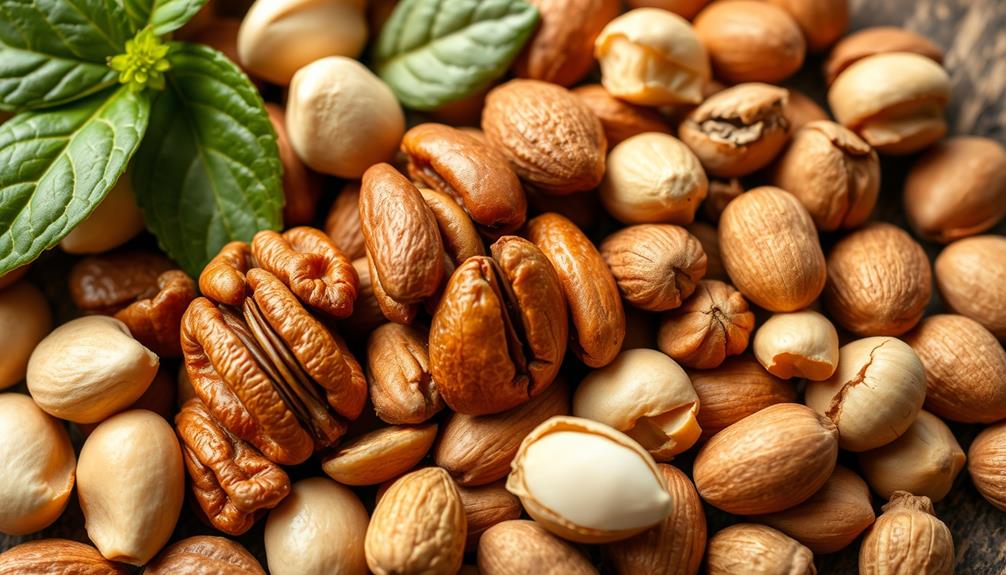Nut flours are your secret weapon for gluten-free and low-carb baking. With options like almond, coconut, and flax, each type brings unique flavors and textures. Almond flour's protein and healthy fats make it versatile, while coconut flour's high fiber content leads to denser baked goods. These flours require specific techniques—like adjusting liquid ratios—so follow specialized recipes for best results. Be mindful of nut allergies and store your flours properly to maintain freshness. By experimenting with combinations, you can enhance flavor and nutrition in your meals. Discover how to make the most of these nutritious flours for your next bake.
Key Takeaways
- Nut flours offer gluten-free and low-carb alternatives, making them ideal for those following keto or managing diabetes.
- Almond flour is versatile for baking, while coconut flour requires more liquid due to its high absorption rate.
- Combining different nut flours enhances flavor and texture, leading to delicious baked goods.
- Proper storage in airtight containers prolongs shelf life and preserves nutritional benefits of nut flours.
- Gradually introduce nut flours to monitor tolerance and avoid digestive discomfort from their high fiber content.
Overview of Nut Flours

Nut flours are a fantastic alternative to traditional wheat flour, especially if you're looking for gluten-free and low-carb options.
You'll find a variety of nut flours, including almond, coconut, chia, flax, and psyllium husk. Almond flour is packed with protein and healthy fats, making it a versatile choice for baking.
Coconut flour, on the other hand, is high in fiber and absorbs more liquid, leading to denser textures in baked goods. Chia flour offers omega-3 fatty acids and moisture, while flax meal adds a nutty flavor and works as a vegan egg substitute.
Psyllium husk can mimic the elasticity of wheat flour, providing a great base for gluten-free doughs. These options make nut flours increasingly popular in healthier baking.
Nutritional Benefits

Many people find that incorporating nut flours into their diets offers significant nutritional advantages. These flours are lower in carbohydrates, making them perfect for those managing diabetes or following a keto diet. They're also high in protein and fiber, promoting muscle maintenance and digestive health.
Here's a quick comparison of some popular nut flours:
| Nut Flour | Nutritional Benefits |
|---|---|
| Almond Flour | High in protein and healthy fats |
| Coconut Flour | Rich in fiber, low in carbs |
| Chia Flour | Contains omega-3 fatty acids |
| Flax Meal | Vegan egg substitute, nutty flavor |
| Psyllium Husk | Adds elasticity to baked goods |
Baking Techniques

Incorporating nut flours into your baking requires some adjustments to achieve the best results.
Start by following recipes designed specifically for nut flours, as they account for their unique properties. Accurate measurement is key since nut flours are denser than traditional flours.
When using coconut flour, remember it absorbs more liquid, so adjust the liquid ratios accordingly. Allow your batter to rest to enhance hydration and cohesion.
You might want to experiment by combining different nut flours, like almond and coconut, for a balanced texture. If you're aiming for keto-friendly desserts, explore sugar substitutes that complement your recipes.
With these techniques, you'll create delicious and nutritious baked goods that suit your dietary needs. Happy baking!
Flavor and Texture Combinations

The delightful interplay of flavor and texture is essential when baking with nut flours, as these unique ingredients can elevate your creations.
Almond flour brings a subtle sweetness and a light, moist texture, making it perfect for cookies and cakes. Coconut flour, on the other hand, adds a rich, tropical flavor and a denser, more absorbent texture, ideal for pancakes or muffins.
By blending these flours, you can achieve a balanced flavor profile and improve the overall mouthfeel.
Don't forget to experiment with other nut flours too; for instance, incorporating hazelnut flour can introduce a delightful nutty nuance. To really enhance the depth of flavor in your baked goods, try adding almond or pecan flour as well. The slight variations in taste and texture from different nut flours can truly elevate your recipes. And don’t forget to balance out your diet with fermented foods for gut health, as they can aid in digestion and promote overall well-being. Try incorporating sauerkraut, kimchi, or kombucha into your meals for a healthy dose of probiotics.
Combining these flours allows you to craft deliciously satisfying baked goods that keep both flavor and texture at the forefront.
Allergies and Considerations

When considering nut flours, how can you guarantee safety for everyone? First, be aware of potential allergies, particularly with almond and peanut flours.
Always check for symptoms, as reactions can range from mild irritation to severe responses, especially with trace amounts. If you're baking for a group, clearly label your dishes and consider alternatives like vegetable, oat, or chickpea flour for those with nut allergies.
Gradually introduce nut flours into your diet to avoid digestive discomfort, as their high fiber content may cause issues for some.
Always opt for high-quality, fresh nut flours, and store them properly. This way, you can enjoy the benefits while keeping everyone safe and happy at the table.
Storage Best Practices

Properly storing nut flours is essential for maintaining their freshness and quality. To guarantee your nut flours last longer and retain their flavor, follow these best practices:
- Airtight Containers: Store your nut flours in airtight containers to prevent moisture and odors from affecting their taste.
- Cool, Dark Places: Keep them in a cool, dark pantry or cupboard, away from direct sunlight and heat sources, which can cause rancidity.
- Refrigeration for Longevity: For extended shelf life, consider refrigerating or even freezing nut flours. Just make sure they're well-sealed to avoid freezer burn.
Usage Tips and Precautions

To make the most of nut flours in your baking, it's important to monitor your personal tolerance levels, especially if you're prone to digestive issues.
Nut flours can be denser and more calorie-dense than traditional flours, so adjust your recipes accordingly. They often can't substitute 1:1 for wheat flour, so look for specific nut flour recipes.
Experimenting with different blends can enhance flavor and texture, but make sure you're using finely ground flours for smoother results. If you're managing dietary restrictions, check for gluten-free certifications.
Additionally, consider incorporating psyllium husk or flax meal for added nutrition and structure.
Always review nutritional information to stay aligned with your health goals while enjoying your baking adventures!
Frequently Asked Questions
Can Nut Flours Be Used in Savory Dishes?
Absolutely, you can use nut flours in savory dishes! They enhance texture and flavor in recipes like breading for meats or as a base for sauces. Just remember to adjust moisture and ratios accordingly.
How Do Nut Flours Affect Baking Time?
Nut flours can alter baking time due to their unique moisture absorption and density. You'll need to monitor your baked goods closely, adjusting time as necessary to guarantee they cook evenly without drying out.
Are Nut Flours Suitable for Vegan Diets?
Nut flours fit perfectly in vegan diets. They bring a treasure trove of nutrients, offering protein and healthy fats, while enhancing your baking experience. Just remember to combine them wisely for delicious results!
What's the Shelf Life of Nut Flours?
Nut flours typically last 3 to 6 months when stored in airtight containers in cool, dark places. If refrigerated, they can last up to a year. Always check for freshness before use to guarantee quality.
Can Nut Flours Replace Breadcrumbs in Recipes?
Nut flours can replace breadcrumbs, offering a gluten-free twist. While breadcrumbs create crunch, nut flours add moisture and flavor. Just remember, adjust the recipe for texture, and you'll craft delicious alternatives effortlessly.
Conclusion
As you navigate the world of nut flours, think of yourself as a culinary artist, painting vibrant flavors and textures onto the canvas of your baking creations. With each scoop of almond or coconut flour, you're not just baking; you're crafting healthier, delicious masterpieces. Embrace the nutritional benefits, experiment with combinations, and remember to store your treasures wisely. With these tips in hand, you're ready to elevate your baking game and savor every bite of your newfound delights!









